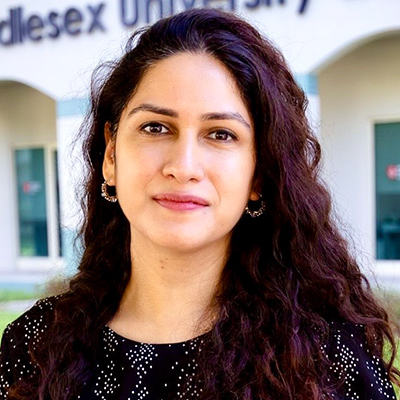

Dr. Nishtha Lamba
Associate Professor, Middlesex University Dubai
“The funding empowers our team to explore tech-mediated pathways to address trauma and promote healing. It has the potential to foster both individual and collective wellbeing. Honored to contribute to DFF’s vision to foster a healthier, more resilient world!”
This project proposes the development of an innovative Artificial Intelligence (AI) powered coach within Virtual Reality (VR) to deliver a first-of-its-kind, automated, and trauma-informed therapeutic interventions. Trauma-induced mental health issues are a significant global concern. Post Traumatic Stress Disorder (PTSD) becomes the root cause of several psychological and physiological illnesses. By 2030, mental health challenges are anticipated to cost the world economy 6 trillion dollars. Unresolved trauma leads to dysfunctionality with symptoms such as crippling anxiety, hopelessness, being on edge, emotional numbness, and disconnection from self. While there have been technological advancements in physical health, they have not trickled down to structured and holistic solutions for mental health.
Evidence-based prototypes will be developed within VR, where a virtual coach will facilitate trauma treatment. The AI-powered coach will be capable of natural speech interactions with the patient, and will deliver a customized treatment plan, based on established psychological principles. The treatments will include tackling symptoms of trauma (using VR-based mindfulness and meditation techniques) and also work towards rewiring trauma related memories that may have remained unprocessed for a long time. This will be implemented through an innovative embodied ‘time travel’ technique, where one will be able to virtually travel to the past or future, and compassionately interact with their younger or older selves (developed using cutting-edge avatar generation and deageing/ageing techniques) in VR to resolve their emotional wounds.
Experiences in VR lead to profound behavioral change in the real-world as well, leading to deeper emotional processing – factors essential for building mental health interventions. The project addresses gaps in trauma treatment by offering a radical and innovative solution, advancing Dubai’s vision of promoting wellbeing within the futuristic city. The project has the potential to transform how we view mental health treatments by increasing accessibility, automation, cost-effectiveness, and reducing overreliance on medications.